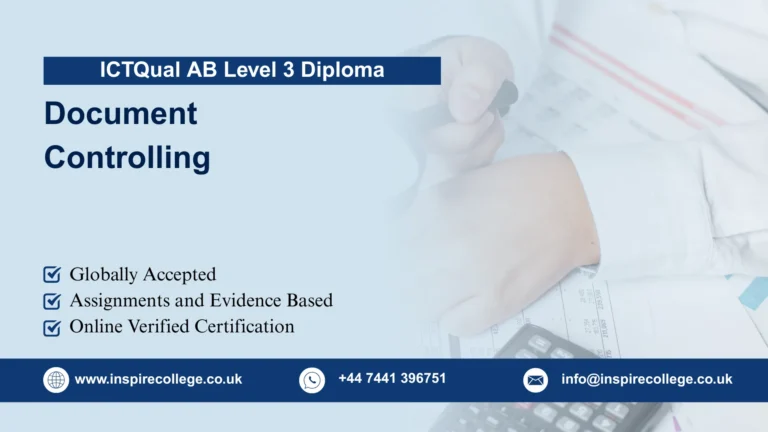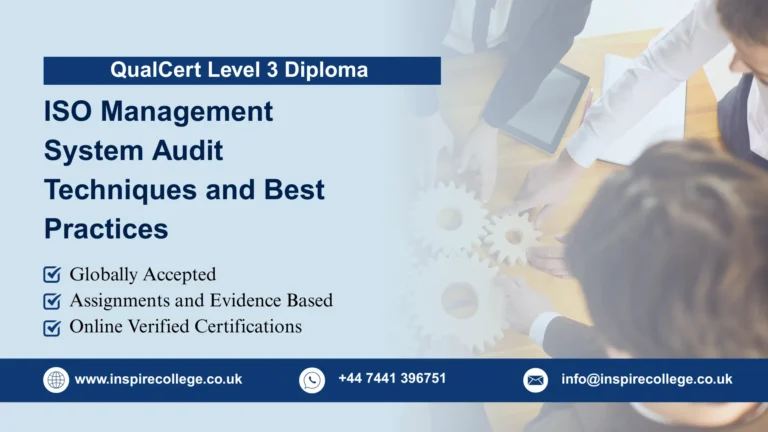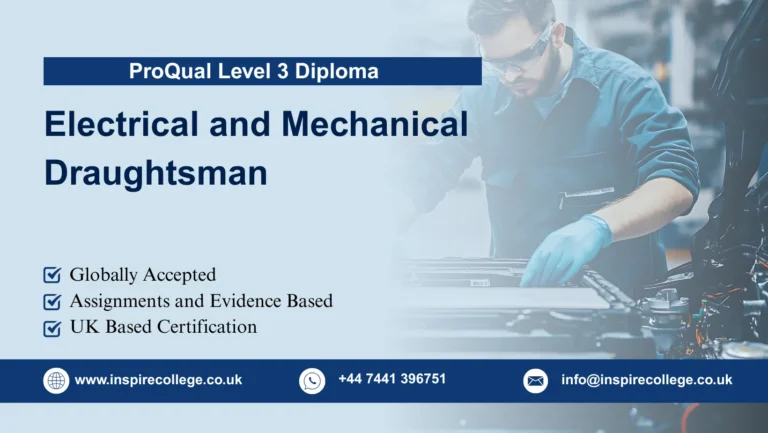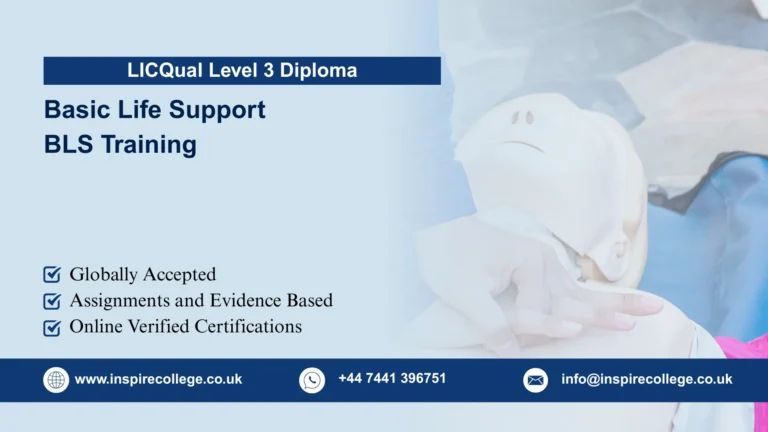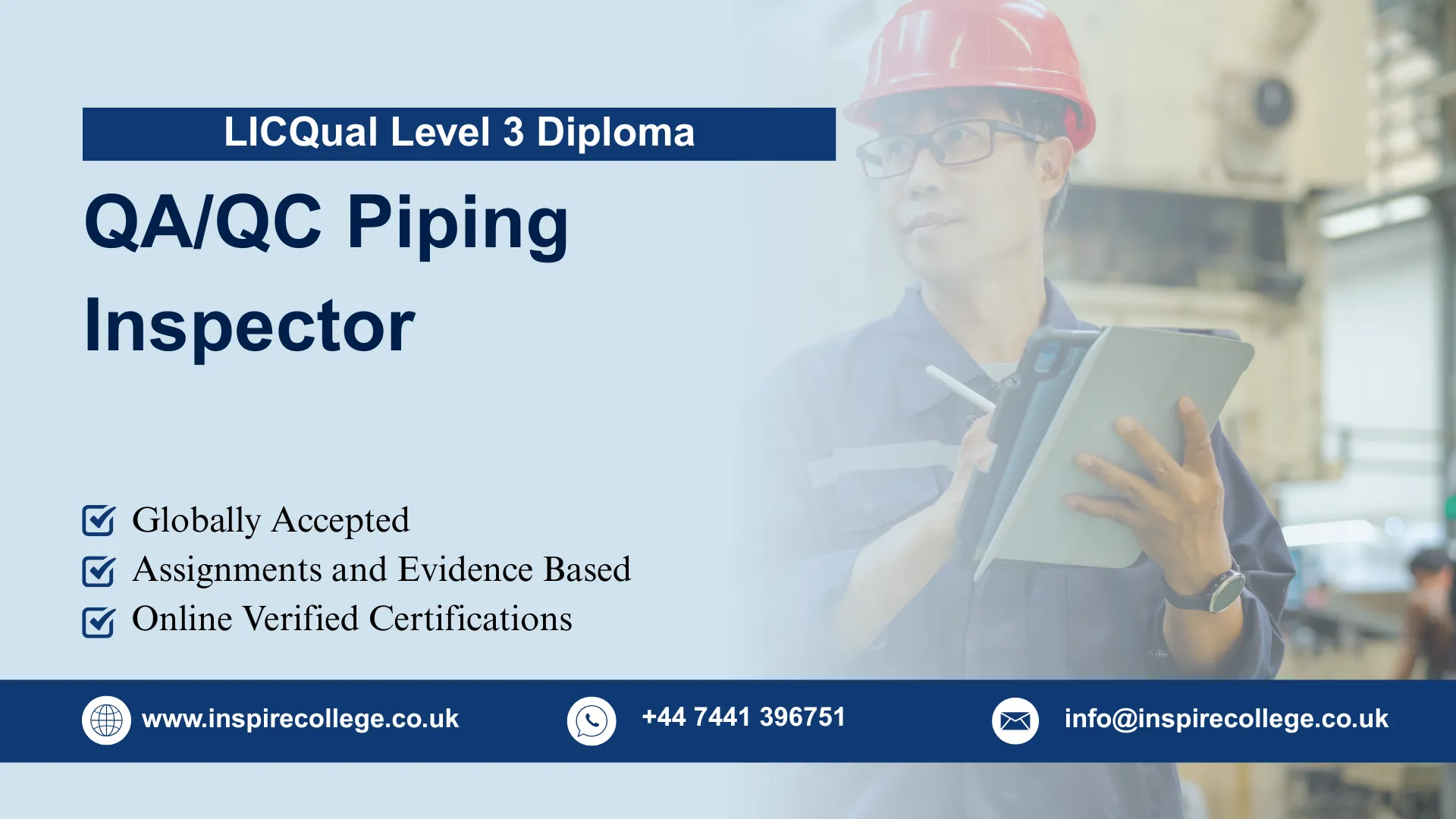
LICQual Level 3 Diploma in QA/QC Piping Inspector
The LICQual Level 3 Diploma in QA/QC Piping Inspector is an industry-focused qualification tailored for individuals aspiring to build a professional career in piping inspection and quality control. With industries such as oil and gas, petrochemicals, power plants, refineries, and construction projects heavily relying on safe and reliable piping systems, the role of a QA/QC Piping Inspector has become indispensable. LICQual Level 3 Diploma in QA/QC Piping Inspector addresses the growing demand for trained professionals capable of ensuring that piping installations meet international quality and safety standards.
The primary purpose of LICQual Level 3 Diploma in QA/QC Piping Inspector is to provide learners with essential knowledge of piping materials, fabrication methods, welding inspection, and non-destructive testing (NDT) techniques. Students will gain a comprehensive understanding of how to inspect and verify piping systems, prepare inspection reports, and ensure compliance with global standards such as ASME, API, and ISO. LICQual Level 3 Diploma in QA/QC Piping Inspector further emphasizes quality assurance (QA) and quality control (QC) principles, enabling participants to play a key role in safeguarding the integrity of industrial projects.
Through structured learning, learners will explore practical applications of inspection, quality planning, and documentation procedures. They will be trained in defect identification, welding procedure reviews, and the interpretation of test results. In addition,LICQual Level 3 Diploma in QA/QC Piping Inspector provides a clear understanding of how inspection activities integrate into the wider scope of project management, health and safety, and regulatory compliance. This makes the program highly relevant for learners who wish to transition into QA/QC roles or progress in their existing careers.
LICQual Level 3 Diploma in QA/QC Piping Inspector is designed for individuals at the early to intermediate stages of their career journey, including fresh graduates, technicians, welders, or junior inspectors seeking to formalize their skills with an internationally recognized qualification. By completing LICQual Level 3 Diploma in QA/QC Piping Inspector, learners will not only gain technical expertise but also develop the confidence to work in large-scale industrial environments where precision, compliance, and safety are paramount.
Upon successful completion, graduates will be equipped to pursue opportunities in piping inspection, welding supervision, QA/QC documentation, and related inspection services across industries. LICQual Level 3 Diploma in QA/QC Piping Inspector also provides a pathway for progression to higher-level qualifications, enabling learners to advance into senior inspection or quality management roles. With its blend of theory, technical knowledge, and applied skills, the LICQual Level 3 Diploma in QA/QC Piping Inspector serves as a gateway to a rewarding career in global industries.
To ensure learners are fully prepared to successfully complete the LICQual Level 3 Diploma in QA/QC Piping Inspector, applicants are expected to meet the following entry requirements. These criteria are designed to maintain academic and professional standards while accommodating learners from diverse educational and professional backgrounds.
- Age Requirement:
- Applicants must be at least 18 years old at the time of enrollment.
- This ensures that candidates possess the necessary maturity, responsibility, and professional readiness to engage with both technical instruction and hands-on practical exercises effectively.
- Educational Requirements:
- A minimum of a high school diploma, secondary school certificate, or an equivalent qualification is required.
- Preference is given to learners with backgrounds in mechanical, civil, industrial, petroleum engineering, or related technical disciplines.
- This academic foundation helps learners grasp technical concepts, engineering principles, and inspection standards introduced during the course.
- Work Experience:
- Prior industry experience is not mandatory; however, at least 1–2 years of relevant experience in piping, welding, construction, or quality control is highly recommended.
- Hands-on exposure allows learners to relate theoretical concepts to real-world applications, enhancing understanding of QA/QC inspection processes and best practices.
- Experience in practical industrial settings improves problem-solving abilities, precision in inspections, and familiarity with standard operating procedures.
- English Language Proficiency:
- Since the course involves technical documentation, standards, and written assessments, applicants should demonstrate a basic level of English proficiency in reading, writing, and comprehension.
- Competency in English ensures learners can interpret technical materials, complete assignments accurately, and actively participate in discussions and practical exercises.
By meeting these entry requirements, learners are positioned to maximize the benefits of the LICQual Level 3 Diploma in QA/QC Piping Inspector. The program equips participants with essential technical skills, practical expertise, and professional knowledge needed to excel in piping inspection, industrial quality control, and related engineering roles. These criteria balance accessibility with academic rigor, ensuring that all learners are adequately prepared for successful course completion and career advancement.
Mandatory Units
The LICQual Level 3 Diploma in QA/QC Piping Inspector, achieve the qualification candidates must achieve all of the mandatory units:
Mandatory Units
By the end of LICQual Level 3 Diploma in QA/QC Piping Inspector, learners will have developed the knowledge, technical skills, and practical competencies required to carry out effective QA/QC inspection activities in piping projects. LICQual Level 3 Diploma in QA/QC Piping Inspector is structured into six comprehensive units, each focusing on critical aspects of piping inspection and quality control.
Unit 1: Fundamentals of Piping Systems and Components
By the end of this unit, learners will be able to:
- Identify and describe essential piping system components such as pipes, fittings, flanges, gaskets, and valves.
- Understand the classification, grading, and selection of piping materials in accordance with industrial standards.
- Interpret basic piping drawings, layouts, schematics, and isometric diagrams.
- Explain the role and functionality of different piping components in ensuring system performance and operational safety.
Unit 2: International Codes, Standards, and Specifications
By the end of this unit, learners will be able to:
- Recognize the importance of international codes and standards in maintaining quality and safety in piping projects.
- Interpret and apply commonly used standards including ASME, API, ASTM, and ISO.
- Differentiate between various project specifications and evaluate their impact on QA/QC processes.
- Ensure compliance with relevant contractual, regulatory, and industry requirements.
Unit 3: Welding Processes and Inspection Techniques
By the end of this unit, learners will be able to:
- Demonstrate understanding of fundamental welding processes including SMAW, GTAW, and GMAW.
- Identify welding symbols, types of joints, and welding positions used in piping fabrication.
- Interpret Welding Procedure Specifications (WPS), Procedure Qualification Records (PQR), and Welder Performance Qualifications (WPQ).
- Conduct basic visual weld inspections, recognize common welding defects, and ensure adherence to quality standards.
Unit 4: Non-Destructive Testing (NDT) in Piping Inspection
By the end of this unit, learners will be able to:
- Explain the principles, applications, and limitations of key NDT techniques such as VT, PT, MT, RT, and UT.
- Select appropriate NDT methods based on inspection requirements and project specifications.
- Interpret test results accurately and determine acceptance or rejection of inspected components.
- Apply safety and quality protocols while conducting NDT inspections.
Unit 5: QA/QC Inspection Procedures and Documentation
By the end of this unit, learners will be able to:
- Develop, review, and implement Inspection Test Plans (ITPs), quality procedures, and checklists.
- Maintain accurate, traceable, and complete inspection records, reports, and logs.
- Document and report non-conformities, recommend corrective and preventive actions, and follow up on implementation.
- Ensure effective documentation flow, material traceability, and compliance with QA/QC protocols.
Unit 6: Pressure Testing and Piping Integrity Verification
By the end of this unit, learners will be able to:
- Understand the objectives and principles of hydrostatic and pneumatic pressure testing.
- Prepare piping systems for pressure testing while following safety procedures and industry standards.
- Monitor, record, and analyze test parameters to verify piping system integrity.
- Identify test failures, defects, or leaks, and recommend appropriate corrective actions.
The LICQual Level 3 Diploma in QA/QC Piping Inspector is designed for individuals who wish to build a rewarding career in quality assurance and quality control within the piping, construction, and industrial sectors. Whether you are a beginner looking to enter the inspection field or an experienced professional aiming to upgrade your expertise, LICQual Level 3 Diploma in QA/QC Piping Inspector offers the right balance of theoretical knowledge and hands-on skills.
LICQual Level 3 Diploma in QA/QC Piping Inspector is particularly suitable for:
- Engineering graduates in Mechanical, Civil, Industrial, or Petroleum disciplines who want to specialize in QA/QC piping inspection.
- Diploma holders and technical trainees seeking to develop advanced skills in welding inspection, piping systems, and quality management.
- Welders, fabricators, and site supervisors planning to transition into quality control and inspection roles.
- NDT technicians, piping inspectors, and QA/QC assistants who want to enhance their qualifications and achieve professional certification.
- Professionals in oil & gas, petrochemical, power generation, and construction industries who require structured training in piping QA/QC.
- Fresh graduates or career changers with a technical background looking to enter the growing field of industrial inspection and quality management.
LICQual Level 3 Diploma in QA/QC Piping Inspector program provides a strong foundation in piping systems, welding processes, inspection techniques, non-destructive testing (NDT), and quality documentation. It is suitable for both entry-level candidates and working professionals, ensuring improved career opportunities in local and international job markets.
Register Now
FAQs for LICQual Level 3 Diploma in QA/QC Piping Inspector

